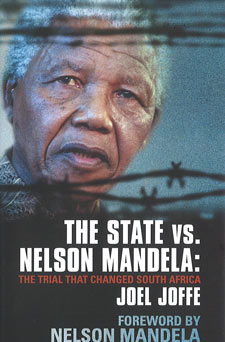On 11 July, 1963 South African police raided a farm near Johannesburg and arrested 10 men. After 90 days of seclusion from their families and from any legal advice they were charged with conspiracy to commit acts of sabotage and terrorism. So began one of the great trials of the twentieth century.
The accused included Nelson Mandela, later South Africa's first democratically elected President, and Govan Mbeki, father of its second. Their alleged co-conspirators included South Africans of European and Indian origin too. The Apartheid Government hailed their arrests as a triumph in the fight against terrorism. The General Assembly of the United Nations, unanimously but for South Africa's own vote, demanded their release.
 Joel Joffre was instructing solicitor for the defence: his account depicts a trial with the forms of justice, but without the substance " literally a show trial. The prosecutor Percy Yutar, is the object of the author's particular contempt, as he is portrayed taking liberties with the rules of evidence, the usual courtesies of criminal procedure, and the presumption of innocence itself. Mr Justice de Wet, who presided in the courtroom, is a more complex figure, who restrains some of the prosecutor's more egregious excesses, but who ultimately fails in his duty to ensure that the trial was fair.
Joel Joffre was instructing solicitor for the defence: his account depicts a trial with the forms of justice, but without the substance " literally a show trial. The prosecutor Percy Yutar, is the object of the author's particular contempt, as he is portrayed taking liberties with the rules of evidence, the usual courtesies of criminal procedure, and the presumption of innocence itself. Mr Justice de Wet, who presided in the courtroom, is a more complex figure, who restrains some of the prosecutor's more egregious excesses, but who ultimately fails in his duty to ensure that the trial was fair.
The reason why South Africa's legal system could not give his clients justice, Joffre argues, was racial prejudice " the judge, prosecutor and the police were all so committed to white supremacy, that they were incapable of treating anyone who challenged it with respect or dignity.
For both sides, the trial was political theatre. The prosecutor's speeches were directed as much to the press, as to the bench. Seven of the accused, even though they knew the charges were punishable by death, gave evidence admitting their guilt.
Nelson Mandela, in his statement from the dock, confessed to acts of sabotage. Although he denied any intention of taking human life, he conceded the day for it might yet be necessary. He cherished, he said, the hope of "a democratic and free society in which all persons live together in harmony and with equal opportunities. It is an ideal which I hope to live for and to achieve", he concluded, "but if needs be it is an ideal for which I am prepared to die".
This book was written in 1965, but put away for a quarter century while the accused men were still in gaol and at risk of recrimination. It was first published upon Mandela's release from gaol in 1990. Now it is reprinted with a foreword from the former president, and a short epilogue reporting the subsequent fate of the dramatis personae " many of whom survived to attend President Mandela's inauguration in 1994.
Amazingly, amongst the invited guests was the long-retired prosecutor, Percy Yutar. In reconciling the various races of South Africa, Mandela reportedly explained, he could not afford the luxury of revenge.
The book is a product of its time: the avowed communist beliefs of some of the accused and their counsel, are noted, without (in that naïve era before the Prague Spring or the Cultural Revolution) seeming to call for any moral comment.
Christians, Anglicans especially, lent financial and rhetorical support to the accused: Alan Paton, the renowned novelist, gave character evidence at the sentencing. Notwithstanding his own revulsion for violence, Paton said, he respected the courage and sincerity of the accused men, and feared for his country if they were put to death.
In his 1948 novel, Cry the Beloved Country, Paton had written: "In South Africa men are proud of their judges, because they believe they are incorruptible. Even the black men have faith in them, though they do not always have faith in the law. In a land of fear this incorruptibility is like a lamp set upon a stand, giving light to all that are in the house".
This worthy sentiment " that the criminal justice system could insulate itself from the prejudices of a racially-segregated society " does not survive a reading of Joffe's book. Its singular lesson is that the sin of apartheid contaminated and corrupted everything in the society around it, the law not excepted.
This is a valuable first-hand historical record. With the benefit of 40 years hindsight, reading it is an uplifting adventure: the proud are resisted; the humble given grace. And even though the outcome is obviously foreknown, the author so draws the reader into the collective mind of the defence team, as to give the The State vs Nelson Mandela a dramatic tension that any devotee of legal thrillers may relish.
























